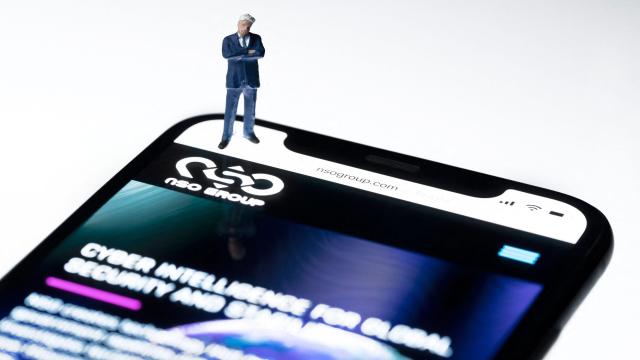The clock may be running out for notorious Israeli surveillance for hire company NSO Group. Sources told Bloomberg that the company’s cumbersome mixture of unpaid debts and growing international scrutiny have made NSO a bloated pariah and is forcing its leadership to consider shutting down its Pegasus spyware unit. Selling the entire company is also reportedly on the table.
The report claims NSO has been in talks with several investment firms and has brought in advisers from global investment bank Moelis & Co. Two unnamed U.S. funds have reportedly considered taking control of Pegasus in a deal that would pour $US200 ($281) million into the unit and reorient the service as a product aimed only at cyber defence. It’s worth noting that any sale impacting Pegasus would mark a monumental shift for NSO since Pegasus accounts for about half of the company’s yearly revenues, according to Bloomberg.
In an email to Gizmodo, NSO Group declined to comment on the report.
NSO has billed itself as a crime-fighting tool used by law enforcement to combat terrorism but has garnered international criticism for its willingness to sell its Pegasus spyware to authoritarian regimes, which include Bahrain, the United Arab Emirates, India, and Hungary to name a few. The company, which some critics have derided as “amoral 21st-century mercenaries,” has reportedly sold software that’s been used to target journalists, human rights advocates, children, and even some political leaders.
News of NSO’s potential sale arrives as the company faces the culmination of its worst year yet. Earlier this year, the credit rating agency Moody’s revealed NSO was at risk of defaulting on around half a billion worth of debt, according to Bloomberg. The agency dropped NSO’s rating by two notches, making it eight levels below an investment grade.
That bad news was partly the result of the US government opting to officially add NSO to its Entity List of banned companies. That designation means U.S.-backed companies will need to acquire a licence from the government if they want to provide services or sell products to these companies, a decision seen by many as one that could seriously hobble NSO’s business. Making matters even worse, a recent report from Reuters claimed NSO’s software was used to target at least nine U.S. State Department Officials.
In other words, NSO kicked the hornet’s nest.
Possibly the most significant of all these blows though came not from a government leader or regulator but rather a single commercial gatekeeper: Apple.
Last month, the iPhone maker filed a lawsuit against NSO Group in the Northern District of California on Tuesday over NSO’s Pegasus software seeking a permanent injunction. If successful, the suit would ban NSO from all Apple servers, devices, hardware, software, or other applications. That could potentially amount to an insurmountable blow for NSO which has made its name-sake as the leading company able to breach Apple’s seemingly impenetrable walled fortress. By cutting off its access to its intended target though, Apple is threatening to hamstring NSO into obscurity.
“State-sponsored actors like the NSO Group spend millions of dollars on sophisticated surveillance technologies without effective accountability. That needs to change,” Apple Senior Vice President of Software Engineering Craig Federighi said in a statement.
Apple’s legal attack came less than two months after the company was forced to issue an emergency patch following a Citizen Lab report that disclosed a zero-day exploit affecting an estimated 1.65 billion Apple devices that had been vulnerable to NSA’s malware for several months.
